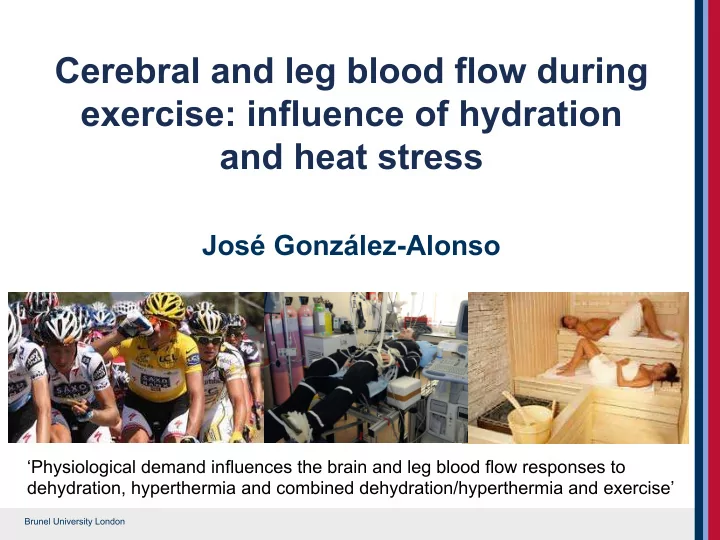

Cerebral and leg blood flow during exercise: influence of hydration and heat stress José González-Alonso ‘Physiological demand influences the brain and leg blood flow responses to dehydration, hyperthermia and combined dehydration/hyperthermia and exercise’ Brunel University London
Brain or leg level Ohm’s law Perfusion pressure brain/leg Fick principle = • VO 2 brain/leg = Blood flow brain/leg x a-vO 2 diff X Vascular Resistance brain/leg Brunel University London
Water losses from different compartments – example 4% body weight loss or 2.8 kg 2.8 L sweat loss Plasma ~ 0.3 L Interstitial ~ 1.1 L Intracellular ~ 1.5 L 4% DECREASE IN BODY WEIGHT (70 kg person) Brunel University London
Impact of exercise-induced dehydration ≈ 4 l/min ≈ 2 l/min Brunel University London González-Alonso et al. J Physiol 513: 895-905, 1998
Dehydration also reduces cerebral blood flow ≈ 120 min at 55% VO 2 max � CMRO 2 = CBF x a-vO 2 diff ? T a = 35ºC; rh = 50%; fan cooling Control euhydration Progressive dehydration Internal Carotid Artery 36±6% Blood Flow � (L/min) � Brunel University London Trangmar et al. Am J Physiol Heart Circ Physiol 309:H1598-H1607, 2015
Leg and cerebral O 2 extraction and O 2 uptake • CMRO 2 = CBF x a-vO 2 diff ≈ Leg VO 2 = LBF x (C a O 2 - C fv O 2 ) ≈ Brain a-vO 2 diff Leg a-vO 2 diff (ml/l) (ml/l) Legs VO 2 (l/min) • CMRO 2 (ml/min) Time (min) Time (min) González-Alonso et al. J Physiol 513: 895-905, 1998 Brunel University London Trangmar et al. Am J Physiol Heart Circ Physiol 309:H1598-H1607, 2015
Determinants of leg and brain blood flow BF = Vascular Conductance x Perfusion Pressure ? ? Brunel University London
Mechanisms reducing leg blood flow with dehydration Pressure (mmHg) Mean Arterial Noradrenaline (nmol/L) *† *† Conductance (U) Leg Vascular Adrenaline (nmol/L) Time (min) Time (min) Time (min) Brunel University London González-Alonso et al. J Physiol 513: 895-905, 1998
Mechanisms of leg blood flow decline ? Arterial O 2 content (ml/l) Time (min) LBF = Leg Vascular Conductance ≈ x MAP Brunel University London
Mechanisms of cerebral blood flow decline? Cerebral blood flow (l/min) Brunel University London Trangmar et al. Am J Physiol Heart Circ Physiol 309:H1598-H1607, 2015
Systemic level • • ? VO 2 = Q x a-vO 2 diff ? Brunel University London
Systemic response to submaximal exercise • • ≈ VO 2 = Q x a-vO 2 diff Brunel University London González-Alonso et al. J Physiol 513: 895-905, 1998
Dehydration at rest and low intensity exercise Brunel University London
Effects of dehydration at rest and small muscle mass exercise 4 Rest Rest Knee-extensor exercise Exercise 3 Pearson et al. Eur J Appl Physiol 113:1499–1509, 2013 Brunel University London
Mechanisms controlling perfusion Vasodilator Vasoconstrictor Activity Activity Brunel University London
Much greater vasoconstrictor activity during whole body exercise – cycling González-Alonso et al. J Physiol 513: 895-905, 1998 Pearson et al. Eur J Appl Physiol 113:1499–1509, 2013 Brunel University London
MSNA and circulating NA increase exponentially with increasing exercise intensity Ichinose et al. J Physiol 586: 2753-2766, 2008 Rosenmeir et al. J Physiol 558:351-365 , 2004 Brunel University London
Mechanisms reducing stroke volume with dehydration? ≈ Cardiac output or Heart rate Stroke volume � or ? End-diastolic � End-systolic � ? volume � volume � Brunel University London
Dehydration reduces SV by diminishing cardiac filling 4 Rest Exercise 3 SV = EDV - ESV � Trangmar & González-Alonso � Exerc Sports Sci Rev � 45(3): 146– 153, 2017 Fig. 2. Comparison of the effect of dehydration and rehydration on left Brunel University London Stöhr et al. J Appl Physiol 111: 891-897, 2011
Dehydration and submaximal cardiovascular capacity Trangmar & González-Alonso. Sports Med 49 (Suppl 1):S69–S85, 2019 Brunel University London
Heat stress exercise and exercise-induced dehydration Brunel University London
Heat stress during incremental cycling 43°C 26°C Rowell et al. J Clin Invest 1966 Brunel University London
Passive heat stress and limbs and head perfusion Whole body heat stress Chiesa et al. Integrative human cardiovascular responses to hyperthermia, In: Périard JD & Racinais S (eds.) Brunel University London Heat Stress in Sport and Exercise. Springer, Cham. p. 45-65, 2019 � �
Combined small vs. large muscle mass (incremental) exercise heat stress and leg blood flow Brunel University London Chiesa et al. Am J Physiol Heart Circ 2015 � Trangmar et al. Physiol Rep 2017 �
Dehydration and whole-body hyperthermia can drastically reduce VO 2max • 0.7 l/min • - 15% VO 2max - 50% endurance performance Cycling ≈ 400 W Nybo et al. J Appl Physiol 90: 1057–1064, 2001 Brunel University London
Heat stress and maximal whole body exercise • Leg VO 2 = LBF x (C a O 2 - C fv O 2 ) González-Alonso & Calbet. Circulation 107:824-830. 2003 Brunel University London
Dehydration impact on the brain CMRO 2 = CBF x a-vO 2 diff Trangmar et al. J Physiol 592: 3143–3160, 2014 Brunel University London
Maintained cerebral aerobic metabolism Trangmar et al. J Physiol 592: 3143–3160, 2014 Brunel University London
Impact of dehydration and heat stress on maximal cardiovascular and aerobic capacity Trangmar & González-Alonso. Sports Med 49 (Suppl 1):S69–S85, 2019 Brunel University London
Additional recommended reading Brunel University London
Recommend
More recommend